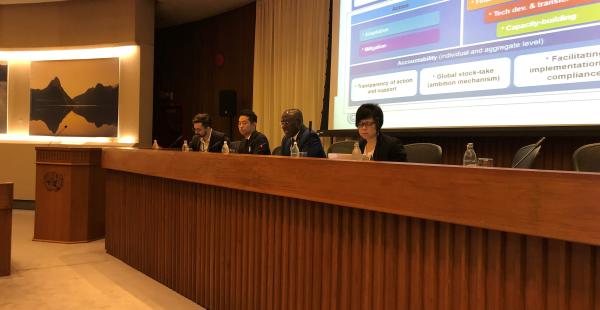
Making MRV work: PATPA’s contribution at the Asia-Pacific Climate Week in Bangkok 2019
PATPA co-organized an event on transparency on the final day of the Asia-Pacific Climate Week with about 90 participants. This session aimed to provide insights from countries about challenges, experiences and lessons learnt from the process of establishing MRV systems. It also briefed the audience on the main support programmes available in the region.
The Asia-Pacific Climate Week took place on 02-06 September 2019 in Bangkok, Thailand. This was the last Regional Climate Week following the ‘Africa Climate Week’ in March and the ‘Latin America and Caribbean Climate Week’ in August. All Regional Climate Weeks created an exchange forum for governments and various key stakeholders, like practitioners, sub-national actors, civil society, representatives from different agencies, etc., to discuss climate change issues on a regional level. The outcomes of all three climate weeks had been transferred to the United Nations Secretary-General Climate Action Summit that took place on 23 September in New York.
Several interesting events and session took place on all 5 days. During the Pre-Summit on 02-03 September, a couple of closed one- or two-day events, like the 12th Regional Dialogue on Nationally Determined Contributions (NDCs), took place. Day 3 was covered by several high-level meetings on different topics, like NDC Implementation, LTS for Decarbonization, Carbon Pricing & Markets, etc. On day 4 various sessions on three main topics took place: Energy Transition, Nature-Based Solutions, Cities & Local Action. The last day was kicked-off by a Transparency Event followed by events on Adaptation Finance, the Energy & Agri-Food Chain as well as a session on Setting the Climate Finance Strategy for the Region. Finally, the week was closed by a concluding event in which the key outcomes of the week had been presented to the audience.
PATPA co-organized the Transparency Event on 06 September together with the UNFCCC and the FAO. Under the title “Enhanced Transparency Framework after Katowice – country perspectives and supporting initiatives”, key actors discussed the latest developments and first experiences with the ETF and the support received. After Katowice, it was crucial to brief the audience on the outcomes of the negotiations on transparency as well as on support programmes available in order to ensure developing countries will soon be able to fulfill the same reporting requirements as the developed countries.
The update on the MPGs by the UNFCCC was followed by inputs from Japan and Indonesia on enhanced transparency as a policy and planning tool. The core part of the event was a panel discussion in which Papua New Guinea, Mongolia, Indonesia and Cambodia discussed challenges on implementing the ETF and experiences with international support initiatives. The final presentation provided an overview of the main support programmes for the Asia-Pacific region on transparency and was well received by the audience. As a conclusion, there is an expertise gap between the national and sub-national level, data collection is still a major challenge as well as the development of country-specific emission factors. Further challenges are the indicator formulation for M&E, the policy formulation for tracking progress and the missing knowledge about the mitigation - adaptation linkages. The country representatives pointed out that common formats for reporting and capacity building for local experts on different levels are the key success factors for the establishment of a well-working transparency system.

